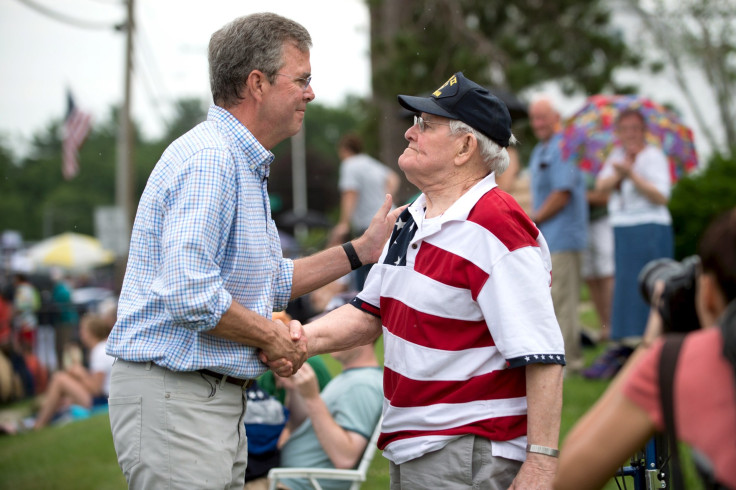Will Jeb Bush's Veterans Affairs Reform Plan Revive His 2016 Republican Presidential Bid, Win Over GOP Voters?

Republican presidential candidate Jeb Bush will attempt to position himself as the veteran-friendly GOP candidate Monday when he formally unveils a policy overhaul of the scandal-plagued Department of Veterans Affairs. Among his proposals: full modernization of the entire VA department, more caregivers and fewer bureaucrats, and improved healthcare for women veterans.
The former governor of Florida’s policies were to be outlined ahead of a meeting with Concerned Veterans for America in South Carolina.
“Ample resources exist within the VA budget to improve the quality and scope of care,” Bush’s policy paper states. “In other government agencies, common-sense reforms have saved billions. The VA must get its house in order and send savings into improving veteran choice and veteran care.”
While Bush is among the favorites to win the Republican Party's 2016 presidential nomination, he has trailed business mogul Donald Trump in recent polls by double figures. A Fox News poll released Sunday showed that Bush has fallen from 15 percent to 9 percent in support from likely Republican voters, losing ground on Trump and dropping to fourth place behind retired neurosurgeon Ben Carson (12 percent) and Texas Sen. Ted Cruz (10 percent). Trump leads the way with 25 percent.
Based on Twitter & my inbox, Fox poll is taking GOP Establishment simultaneously to new levels of denial & freak out pic.twitter.com/K7A38ZpJQY
— Mark Halperin (@MarkHalperin) August 16, 2015Bush will hope to reverse his fortunes with a bet on veterans' support, counting on his record as Florida governor between 1999 and 2007. During his stint in the Sunshine State, which has the third-highest number of veterans in the country, Bush notes in his policy document that he “increased the number of state veterans’ homes from two to six ” and increased the property tax exemption for disabled vets from $500 to $5,000. He also passed laws that “provide free undergraduate tuition at state colleges and universities to Florida recipients of the Purple Heart and their children."
One of the pre-existing VA policies that Bush hopes to expand and improve on is the “choice” option for care. Under the existing policy, veterans can choose a primary care doctor only if they can’t get an appointment at a Veterans Affairs hospital within 30 days or if they live 40 miles or more from a VA health facility. Figures provided by Bush's policy document show that only 30,000 veterans are enrolled in the choice program, from among some 9 million veterans living in the U.S.
"That number should be broadened and limitations to private access reduced. If a veteran wants to see a neighborhood physician, he or she has earned that choice. The VA must remain the guarantor of that choice and that care," Bush's policy document says.
Bush aims to do that without cutting any VA hospitals or medical staff. The policy document claims that this approach will reduce waiting times for the neediest veterans and avoid unnecessary deaths.
Bush says he will find the extra funds to broaden choice care by “cutting excess administrators (not caregivers)” and eliminating “billions of dollars in waste, fraud, and abuse.” The brother of former President George W. Bush and son of former President George H.W. Bush also wants to see improved online resources and services for veterans, claiming that the current offerings are old and difficult to navigate.
On the topic of healthcare for female veterans, Bush wants to build dedicated teams that will expand the VA’s offerings in obstetrics, gynecology, and specializations in ovarian and breast cancer care.
Bush’s policy document represents the first meaningful mention of veterans policy since the race to become the Republican presidential candidate began. Veteran’s issues received only one brief mention at the end of the first GOP debate, held Aug. 6 in Cleveland. Before that, the only high-profile moment came when Trump questioned the service record of Arizona Sen. John McCain, who was a prisoner of war in Vietnam. Of the 10 leading candidates that appeared during the two-hour prime-time GOP debate, not one has military experience.
The next Republican presidential debate will be Sept. 16 on CNN. It will be held at the Ronald Reagan presidential library in Simi Valley, California.
© Copyright IBTimes 2024. All rights reserved.












